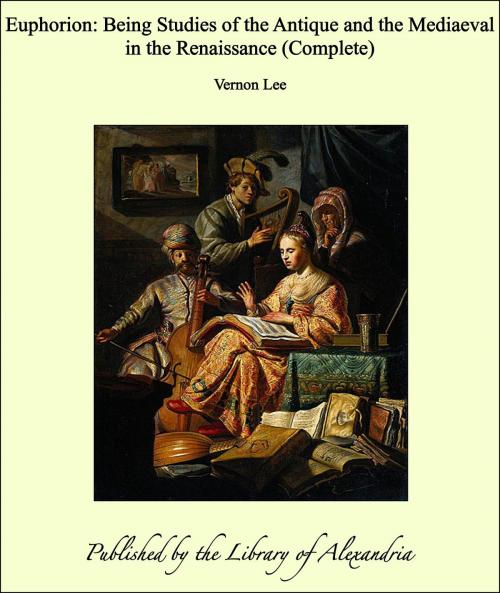Euphorion: Being Studies of the Antique and the Mediaeval in the Renaissance (Complete)
Nonfiction, Religion & Spirituality, New Age, History, Fiction & Literature| Author: | Vernon Lee | ISBN: | 9781465558664 |
| Publisher: | Library of Alexandria | Publication: | March 8, 2015 |
| Imprint: | Language: | English |
| Author: | Vernon Lee |
| ISBN: | 9781465558664 |
| Publisher: | Library of Alexandria |
| Publication: | March 8, 2015 |
| Imprint: | |
| Language: | English |
Euphorion is the name given by Goethe to the marvellous child born of the mystic marriage of Faust and Helena. Who Faust is, and who Helena, we all know. Faust, of whom no man can remember the youth or childhood, seems to have come into the world by some evil spell, already old and with the faintness of body and of mind which are the heritage of age; and every additional year of mysterious study and abortive effort has made him more vacillating of step and uncertain of sight, but only more hungry of soul. Postponed and repressed by reclusion from the world, and desperate tension over insoluble problems; diverted into the channels of mere thought and vision; there boils within him the energy, the passion, of retarded youth: its appetites and curiosities, which, cramped by the intolerant will, and foiled by many a sudden palsy of limb and mind, torment him with mad visions of unreal worlds, mock him with dreams of superhuman powers, from which he awakes in impotent and apathetic anguish. But these often- withstood and often-baffled cravings are not those merely of scholar or wizard, they are those of soldier and poet and monk, of the mere man: lawless desires which he seeks to divert, but fails, from the things of the flesh and of the world to the things of the reason; supersensuous desires for the beautiful and intangible, which he strives to crush, but in vain, with the cynical scepticism of science, which derides the things it cannot grasp. In this strange Faustus, made up of so many and conflicting instincts; in this old man with ever- budding and ever-nipped feelings of youthfulness, muddling the hard-won secrets of nature in search after impossibilities; in him so all-sided, and yet so wilfully narrowed, so restlessly active, yet so often palsied and apathetic; in this Faustus, who has laboured so much and succeeded in so little, feeling himself at the end, when he has summed up all his studies, as foolish as before—which of us has not learned to recognize the impersonated Middle Ages?
Euphorion is the name given by Goethe to the marvellous child born of the mystic marriage of Faust and Helena. Who Faust is, and who Helena, we all know. Faust, of whom no man can remember the youth or childhood, seems to have come into the world by some evil spell, already old and with the faintness of body and of mind which are the heritage of age; and every additional year of mysterious study and abortive effort has made him more vacillating of step and uncertain of sight, but only more hungry of soul. Postponed and repressed by reclusion from the world, and desperate tension over insoluble problems; diverted into the channels of mere thought and vision; there boils within him the energy, the passion, of retarded youth: its appetites and curiosities, which, cramped by the intolerant will, and foiled by many a sudden palsy of limb and mind, torment him with mad visions of unreal worlds, mock him with dreams of superhuman powers, from which he awakes in impotent and apathetic anguish. But these often- withstood and often-baffled cravings are not those merely of scholar or wizard, they are those of soldier and poet and monk, of the mere man: lawless desires which he seeks to divert, but fails, from the things of the flesh and of the world to the things of the reason; supersensuous desires for the beautiful and intangible, which he strives to crush, but in vain, with the cynical scepticism of science, which derides the things it cannot grasp. In this strange Faustus, made up of so many and conflicting instincts; in this old man with ever- budding and ever-nipped feelings of youthfulness, muddling the hard-won secrets of nature in search after impossibilities; in him so all-sided, and yet so wilfully narrowed, so restlessly active, yet so often palsied and apathetic; in this Faustus, who has laboured so much and succeeded in so little, feeling himself at the end, when he has summed up all his studies, as foolish as before—which of us has not learned to recognize the impersonated Middle Ages?















